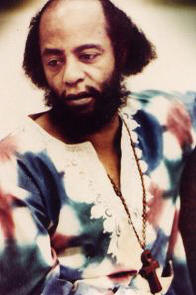About Mondo
Wopashitwe Mondo Eyen we Langa

Mondo we Langa
Wopashitwe Mondo Eyen we Langa (formerly known as David Rice) has been a political prisoner in the Nebraska State Penitentiary since 1970, when he and fellow Black Panther Ed Poindexter were convicted for the bombing murder of Omaha policeman Larry Minard, and given life sentences. Both have consist-ently denied any connection with the crime, and Amnesty International, after reviewing the many inconsistencies in the trial transcript, as well as FBI files obtained through the Freedom of Information Act, has called for either a new trial, or immediate release.
Mondo was born in Omaha in 1949, graduated from Creighton Preparatory School and took courses at Creighton University. He wrote for the local underground paper, Buffalo Chip, from 1969 to 1970 and joined the Black Panther party. In the 32 years since his conviction, Mondo has created art, written short stories, poetry and journalism. He had five books of poetry published between 1973 and 1978 and has contributed poems and stories to such literary journals and magazines as Prairie Schooner, The Black Scholar, ARGO, Black American Literary Forum, Shooting Star Quarterly Review, Pacifica Review, Obsidian, Black Books Bulletin and over 30 more. In addition, his poem, "Great Babaleur" was featured in Malcolm X: By Any Means Necessary by Walter Dean Myers (Scholastic, Inc, 1993). Two of Mondo's plays, Different Dances and We Dance in Our Neighborhood, were performed by Ujima Youtheatre in Nebraska, as well as in New York City.
By the time he joined the Omaha chapter of the Black Panthers in the spring of 1969, he had already been working with the chapter in its breakfast-for-children program and other chapter activities in the community and was or had been part of a variety of other groups--such as Lake-Charles Community Action and other groups involved in community organizing for empowerment; Mothers for Adequate Welfare; which sought welfare and tenants' rights; Ad Hoc Education Planning Committee, which was concerned mainly with issues of racism in the Omaha public school system; and groups and organizations promoting political education, trying to bring an end to the U.S. government's war against the people of Vietnam, and otherwise trying to bring about significant change.
In the summer of 1970, Mondo (known at that time as "David Rice") was Deputy Minister of Information of the Omaha chapter of the Black Panther Party's National Committees to Combat Fascism. Ed Poindexter was the chapter's Deputy Chairman. In August, an Omaha police officer was killed by a suitcase bomb placed in a vacant house. Within a couple of weeks, Mondo, Ed, and other chapter members and associates were arrested. Through a process of perjured testimony, use of Panther ideology and rhetoric to inflame a jury of 11 Caucasians and one person of African descent, falsified and manufactured physical "evidence," etc., Mondo and Ed were tried and convicted of the killing and sentenced to life imprisonment in April of 1971. The youngster who testified that he placed the bomb and made the 911 call to lure police to the house, pled guilty to "juvenile delinquency" shortly after Mondo and Ed's conviction and sentencing.
Within just a few years after entering the state penitentiary, Mondo joined the Islamic community there, primarily for reasons associated with brother-hood. He says that after maybe four years, he left Islam because, "it was too much like being a Christian all over again." Some time in ‘78 or ‘79, the Harambee Afrikan Cultural Organization was founded. He joined it shortly after that and has been in positions of leadership of that organization since then. He is also editor of the organization's newsletter. Mondo has, over the years, been involved in theatre and writers' workshops, a prisoners' art guild, and has essentially continued being a part of a community, just as he was before his arrest, and just as he will do when he is rightfully returned to the African community outside of the penitentiary.
Mondo is one of several co-authors (including Yosef-ben-Jochannan, John Henrik Clarke, et al) of The Race: Matters Concerning Pan Afrikan History, Culture, and Genocide (Native Sun Publishers, 1992). He is a contributor to Nebraska Voices, the anthology commissioned by the Nebraska Humanities Council in celebration of the sesquicentennial of Nebraska statehood.
In prison, he has continued his education, and now in his 50s, is a mentor and exemplar to young inmates just coming into the system. In all the years of his incarceration, he has not committed a single act of violence; he has, in fact, been an exemplary prisoner.
But he is an African-American, and to the authorities, no matter what evidence is presented, he is a "cop-killer." The Nebraska Pardons Board is made up entirely of elected officials (the Governor, Attorney General and Secretary of State), and election depends on being "tough on crime."
For more information: http://www.n2pp.infopp.info and http://www.mondo.info